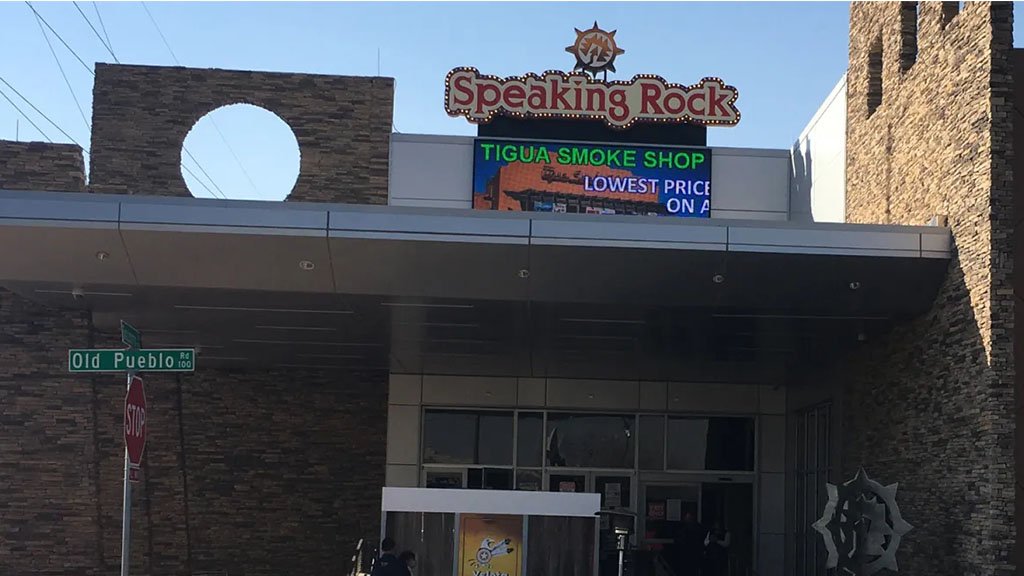U.S. Supreme Court sides with El Paso’s Tigua tribe in decades-long gambling fight with Texas

El Paso’s Tigua Indians can legally operate bingo-based games at their Speaking Rock Entertainment Center in the Lower Valley, the U.S. Supreme Court ruled in a 5-4 decision on Wednesday.
The decision is a major victory for the Tiguas, formally known as the Ysleta del Sur Pueblo, in their three-decade fight with the state of Texas over gambling.
Justice Neil Gorsuch, who has extensive experience in tribal law, wrote the majority opinion. He was joined in the decision by Justices Stephen Breyer, Sonia Sotomayor, Elena Kagan and Amy Coney Barrett. Chief Justice John Roberts wrote the dissent, joined by Justices Clarence Thomas, Samuel Alito and Brett Kavanaugh.
The ruling doesn’t allow the Tiguas to add other forms of gambling.
“None of this is to say that the Tribe may offer any gaming activity on whatever terms it wishes. It is only to say that the Fifth Circuit (Court of Appeals) and Texas have erred in their understanding of the Restoration Act,” Gorsuch wrote.
Officials with the tribe and state could not be immediately reached for comment after the ruling. T
The legal fight between Texas and the Tiguas started in the early 1990s, when the tribe tried to expand gambling on its land and the state continuously went to federal court to block those efforts. The Alabama-Coushatta tribe in East Texas has engaged in a similar fight. That tribe likely will benefit from Wednesday's ruling as well.
The crux of the issue is the 1987 Restoration Act, which was passed by Congress to extend federal recognition to the two Texas tribes. That same law, however, includes a provision that prevents the Tiguas and Alabama-Coushatta from offering gambling that is prohibited in Texas. They are the only tribes in the United States barred by a state government from offering gambling on their land.
The Tiguas say their games of chance at Speaking Rock Entertainment Center in El Paso’s Lower Valley are based on bingo, a game that is permitted and regulated in Texas. The state has argued that its laws on bingo prohibit the kind of games offered by the tribe.
Gorsuch rejected the state’s argument in the majority opinion.
“No one questions that Texas ‘regulates’ bingo by fixing the time, place, and manner in which the game may be conducted. The State submits only that, in some sense, its laws also ‘prohibit’ bingo — when the game fails to comply with the State’s time, place, and manner regulations. But on that reading, the law’s dichotomy between prohibition and regulation collapses,” he wrote.
Roberts criticized that reasoning in his dissent.
“A straightforward reading of the statute’s text makes clear that all gaming activities prohibited in Texas are also barred on the Tribe’s land. The Court’s contrary interpretation is at odds with the statute’s plain meaning, conflicts with an unambiguous tribal resolution that the Act was ‘enacted in accordance with,’ … and makes a hash of the statute’s structure,” the chief justice wrote.
The 5th Circuit Court of Appeals, based in New Orleans, has repeatedly sided with the state and the U.S. Supreme Court has passed on numerous opportunities to weigh in. That changed last year, when the Supreme Court agreed to hear the latest dispute.
The Biden administration has sided with the Tiguas, urging the Supreme Court to find that the 5th Circuit has erred in its rulings over the past three decades. The high court heard oral arguments in the case in February, with justices giving no indication of how they might rule.
The case now goes back to the 5th Circuit Court of Appeals for further action.
“The Restoration Act bans as a matter of federal law on tribal lands only those gaming activities also banned in Texas. To allow the Fifth Circuit to revise its precedent and reconsider this case in the correct light, its judgment is vacated, and the case is remanded for further proceedings consistent with this opinion,” Gorsuch wrote.
A third federally recognized tribe in Texas, the Kickapoo, also offer bingo-based games at a casino in Eagle Pass. The state has not challenged the Kickapoo gambling because the tribe is covered by a different federal law than the Tiguas and Alabama-Coushatta, the Indian Gaming and Regulatory Act.
This is a developing story and will be updated.
This article first appeared on El Paso Matters and is republished here under a Creative Commons license.![]()




